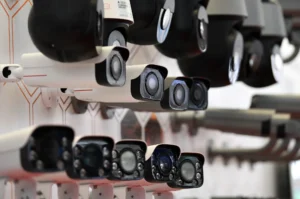Iran hacks into Israel’s CCTV network, fueling security concerns as tensions rise following Netanyahu’s warning to Khamenei. Experts fear potential threats to Israeli leadership.
Iran Hacks Into on Israel: A New Front in the Shadow War

Iran Hacks Into Israel’s CCTV Cameras
The escalating tensions between Iran and Israel have taken a dramatic turn, moving beyond traditional military threats into the realm of sophisticated cyber warfare. Recent reports reveal a concerning development: Iranian hackers have successfully breached security cameras across Israel, turning them into a widespread surveillance network. This alarming incident raises critical questions about national security, the vulnerability of internet-connected devices, and the evolving nature of modern conflict.
A Nation Under Surveillance: The Scale of the Breach
The scale of the Iranian cyberattack is significant. Reports indicate that both private and public security cameras have been compromised, granting Iranian operatives real-time access to sensitive locations across Israel. This includes the potential monitoring of crucial infrastructure, military movements, and even high-profile individuals. The ability to observe missile strike impacts, troop deployments, and other sensitive military operations represents a major intelligence coup for Iran. The fact that this is happening while Israel maintains a media blackout only underscores the severity of the situation.
Exploiting Weakness: The Method Behind the Madness
The success of this cyberattack highlights a critical vulnerability in the widespread adoption of internet-connected devices. Many security cameras, particularly older models, often come with default factory passwords that are easily exploited by malicious actors. This lack of robust security measures leaves countless devices vulnerable to hacking, transforming them from simple surveillance tools into potential weapons in the hands of state-sponsored adversaries. The Iranian hackers appear to have leveraged these weaknesses, effectively turning a nation’s security infrastructure against itself.
Implications and Geopolitical Ramifications
This cyberattack carries profound implications for both Israel and the broader geopolitical landscape. It demonstrates Iran’s growing capabilities in cyber warfare and its willingness to utilize these capabilities against a major regional rival. The potential for further attacks, targeting critical infrastructure or other sensitive systems, remains a significant concern. The incident also underscores the urgent need for improved cybersecurity protocols, not only in Israel but globally. The widespread reliance on internet-connected devices necessitates a renewed focus on strong passwords, regular software updates, and robust security measures to prevent similar attacks in the future.
The Netanyahu Factor: A Possible Trigger?
Some analysts suggest a possible link between this cyberattack and recent escalating rhetoric between Israeli Prime Minister Benjamin Netanyahu and Iranian Supreme Leader Ayatollah Ali Khamenei. Netanyahu’s strong statements against Iran could have served as a catalyst for this aggressive cyber response. However, further investigation is needed to confirm this correlation. Regardless of the potential motivation, the attack represents a significant escalation in the ongoing conflict and highlights the increasingly blurred lines between traditional warfare and cyber warfare.
The Future of Cyber Warfare: A Call to Action
The Iranian cyberattack on Israel’s CCTV network serves as a stark reminder of the evolving nature of modern conflict. The vulnerability of internet-connected devices and the potential for their exploitation in cyber warfare should prompt a global reassessment of security protocols. Increased investment in cybersecurity infrastructure, enhanced awareness among users, and international cooperation are crucial to mitigating the risks associated with this growing threat. The incident underscores the urgent need for a proactive, multi-faceted approach to safeguarding against future attacks and ensuring national security in the digital age.

















![[VDO] What evidence does Thailand have to claim Tamoan Thom Temple as its own? 26 What evidence does Thailand have to claim Tamoan Thom Temple as its own](https://hothotnews.com/wp-content/uploads/2025/06/What-evidence-does-Thailand-have-to-claim-Tamoan-Thom-Temple-as-its-own-e1751463052220.jpg)


